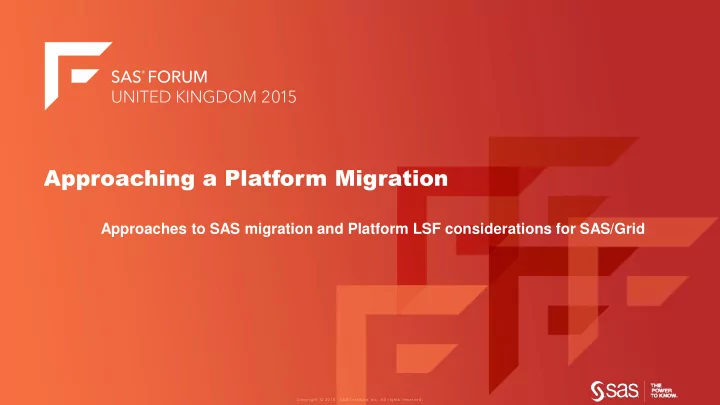

Approaching a Platform Migration Approaches to SAS migration and Platform LSF considerations for SAS/Grid
Topics • Scope • Architecture • Migration • Questions • Grid considerations • Questions
Bell Canada SAS migration • 24 months • 16 Business units • 50 Developers • 200 SAS analysts • 600 Enterprise Guide users • 4000 Job Flows • 4000 Web service users • 96 cpu and 44 Tb disk
Old architecture • Two maxed-out Solaris M5000 • Compute and Metadata on both • Solaris MidTier • SAS v92 • Platform LSF and Process Manager (not Grid)
SAS Information Map SAS WRS/WSTP/ Calendar Editor Studio Flow Manager WOLAPVJ/IDP/BID via Base SAS SAS Enterprise Guide browser via X-window(Exceed) SAS Add-in for MS Office SAS OLAP Cube Studio SAS Enterprise Miner SAS Personal Login SAS DI Studio SAS Management Console Manager EDW/Data Sources LAN Pre-Production Production Oracle Sol/Sparc Oracle Sol/Sparc Oracle Sol/Sparc Oracle Sol/Sparc dc3c89 dc2c1s dc3c1n dc2cb8 Meta/Compute Meta/Compute Mid-Tier Mid-Tier SAS Metadata Server SAS Metadata Server SAS Web Report Studio SAS Web Report Studio SAS Web OLAP VIewer SAS Web OLAP VIewer BUxApp/BUxApp-Adm x 12 BUxApp x 12 SAS Web Stored Process SAS Web Stored Process Apps Apps SAS Workspace Server SAS Workspace Server SAS BI Dashboard SAS BI Dashboard SAS Data Step Batch Server SAS Data Step Batch Server SAS Information Delivery SAS Information Delivery ... ... Portal Portal JBOSS JBOSS SAS Stored Process Server SAS Stored Process Server SAS Content Server SAS Content Server SAS Pool Workspace Server SAS Pool Workspace Server SAS Analytic Platform SAS Analytic Platform SAS OLAP SAS OLAP JASS Auth w/SiteMiner LSF/PM Scheduler LSF/PM Scheduler SASServer1 SASServer1 Jboss Jboss SPDS Ent Content Cat Dataflux/RTIS SAS/Access to DB2/Sybase/Tera/ODBC/Oracle/MSSQL SAS/Access to DB2/Sybase/Tera/ODBC/Oracle/MSSQL Data Surveyor to SAP Data Surveyor to SAP Centrify/AD Authentication Centrify/AD Authentication Pre-PRD SAN PRD SAN Metadata Security – Locked, Non-Governed Metadata Security – Locked, Governed File System Security – Locked, Non-Governed File System Security – Locked, Governed
New architecture • Red Hat Enterprise Linux • Dev, QAT and Prod hardware segregation • SASv9.4 with SAS/Grid • Platform LSF 9.1 and Process Manager with Group admin capability
Simpler version
Migration approaches • Slow re-engineering • Outsource • Self service • Big Bang ‘Instance’ as unit of migration
Instance • Set of logical servers • Unix mount point • Metadata group • AD group
Slow re-engineering • Replicate Prod to separate hardware (QAT) • Multiple instances • 6 months transition from old Prod to QAT • Extensive changes and testing • 2 month cutover from QAT to new Prod
Outsource • Like-for-like replication • Fixed price over 4-6 weeks • Manual keyboard entry • Offshore providers following standard template
Self service • Full access to separate instance on Dev • Limited access to separate instance on Prod • 3 months gradual cutover • Careful user management
Big bang • Full access to separate instance on Dev • 6 months functional testing in Dev • Two months test load in Prod • Cut-over on a long weekend • No back out after first 48 hours
Management • Weekly Governance Committee – sponsor, business primes • Daily activity call – project manager, tech leads • Adhoc strategy planning – tech leads, architects
Questions? • Instances – Logical servers, separate file system, Groups • Slow re-engineering – migration tool failures, manual verification using DIS, DeployedJobs and JobFlows • Outsourcing – working within resource limitations, accommodating environment differences • Self-service – co-ordinating stakeholders • Big bang – risk vs benefit
Migration to SAS/Grid • Load balancing • Governance • Production hardening • Delegation and segregation • Monitoring • Single node services
Load balancing • Protecting critical services • Application specifics • LSF queues • Slots • RTM web interface
Governance • Allocation of shared resources • Conflicts and contention • Delegation of administrative authority • Dynamic control • Operational rules
Production hardening • Change management • Configuration • Service guarantees • Security • Failover and recovery
Delegation and segregation • Metadata Roles • Metadata ACTs • Internal accounts • Unix ACLs • Active Directory Groups + Centrify
Monitoring • RTM – User and admin access • LSF commands – bjobs, bstatus, bhist, jhist, lsload • Unix monitoring tools – top, nmon, Vantage • SAS MC Schedule Manager • Platform Flow Manager
Single node services • SAS/Share and SAS/IntrNet • Outgoing jdbc • Incoming sftp • Xcmd limitations • DataFlux • Hadoop
Questions? • Load balancing • Governance • Production hardening • Delegation and segregation • Monitoring • Single node services
Protecting critical services • Metadata server(s) • DataFlux • Grid controller(s) • SAS/Share • SAS/IntrNet
Application specifics • Enterprise Guide – report consumers, analysts, developers • DI Studio – Jobs, Flows • Process Manager – Flows, calendars
LSF Queues • Production • Priority • Normal • Express
Slots • 8 per cpu default • More for ETL • Less for EG
RTM web interface
RTM web interface
Contact andrew.farrer@bell.ca acfarrer@gmail.com
Instance • Set of logical servers • Unix mount point • Metadata group • AD group
Metadata objects
Abstract • In the process of moving 900 users, from SASv9.2 on Solaris to Grid/SASv9.4 on Linux, many lessons were learned. 16 business units had a diverse set of expectations and 4 different strategies were used : Self managed, Outsourced, Re Engineered and Big Bang. The presentation will cover some architecture, the project management structure and each scenario. If time permits, some useful techniques and pitfalls will be discussed.
www.SAS.com
Recommend
More recommend